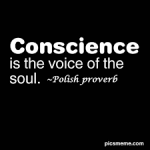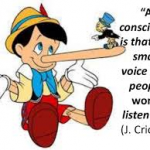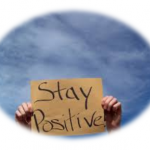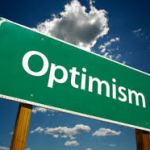By George Karagiannis, George Andrikopoulos, George Galanopoulos and George Thanopoulos (B class)

Conscience is an aptitude, faculty, intuition or judgment that assists in distinguishing right from wrong. Moral judgments may derive from values or norms (principles and rules). In psychological terms conscience is often described as leading to feelings of remorse when a human commits actions that go against his/her moral values and to feelings of rectitude or integrity when actions conform to such norms. The extent to which conscience informs moral judgment before an action and whether such moral judgments are or should be based in reason has occasioned been debated through much of the history of Western philosophy.
In psychology, there is a specific domain which is called consciousness. This is the area where the human emotions ‘’live’’. Though there is no map for our brain, scientists speculate that in that specific centre, neurocells are called to make decisions. That is the area that most people connect and sometimes confuse with the entire organ, our brain.
Morphology
Our brains consist by two hemispheres and are divided in three sectors. The left hemisphere is often accused to be the one that creates our emotions, and alters our mood. The right one will embrace and incarnate the term conscience. The right hemisphere creates reason, logic, and sometimes informs the left one, when it’s time for the emotions to take control. The three sectors are the back, middle, and front areas as we see them from up front. The front one is responsible for the well-being of our organism. The middle one is dedicated to craft emotions and the back one receives messages from the rest of the human body. Although this is the simplest representation of our brain, it tends to be the only one we’ve got.

CONSCIOUSNESS
Consciousness is the area where decisions are made. Though we cannot accurate pinpoint the exact location, we tend to believe that consciousness is heavily related with unconsciousness and its activity expands throughout the entire brain. We are our consciousness, our sub-consciousness and mostly our unconsciousness. Our personality, our thoughts, our way of living, all of our lives are attached to and depended on these three. Scientists claim that our character stops forming around the age of three. This theory is partially true, because in that age we actually establish the criteria with which we are going to judge the word around us. Thus practically our personality and everything related to us, is pretty much formed. Though, we’d make a great mistake if we claimed that people cannot change. We control our lives and we can change no matter how old or young we are. Decisions, thoughts, ideas, everything can change as long as someone inputs the correct ideas in our brain.
HUMOR
We all tell jokes. Some of them are funny, some of them are not as funny as others and some are not funny at all. We claim that humans that have the ability to distinguish good (a.k.a. funny) jokes have good sense of humor. But what is humor? Our brain, and especially conscience, has the ability to predict outcomes. When an outcome is not predicted, usually creates stress and fear. Of course, when you are in a comfortable spot, your brain cannot detect any threat so it feels relieved. This relief creates a sense of joy and this joy is translated into laughter. So humor is actually the inability of our brain to predict outcomes. That’s the exact reason why a joke repeated endless times, doesn’t make us laugh.
Closing
Our brain is unique; it is the only organ of our entire body that has not been fully explained yet.
‘’Everyone is a genius, though if you judge a fish from its ability to climb a tree, you will think it is stupid for the rest of your life‘’
Albert Einstein





















